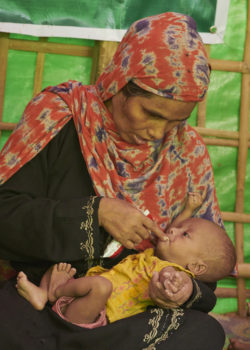
Photo: Paul Jeffrey/ACT
More people than ever before have access to health care and education. Yet lack of access to Sexual Reproductive Health and Rights (SRHR), including comprehensive sexuality education and access to HIV testing and treatment, result in grave health disparities, where those that live in poverty are most impacted. These basic social protection needs face normative, financial and implementation challenges at global, national and local level.
In addition, the space for individuals, human rights defenders and civil society organizations working on SRHR issues is very limited and decreasing in many contexts. Increasing social and economic inequalities within and between countries further erode the possibility of people’s equal access to health services, education and other forms of social protection, particularly to the disadvantage of women, girls and LGBTQI persons. Ensuring no one is left behind, as is stated in the 2030 Agenda, means addressing global inequalities and working towards universal access to health care.
The social determinants of health – the conditions in which people are born, grow, live, work and age – include economic policies and systems, development agendas, social policies, political systems and social, cultural and religious norms. These social determinants produce and sustain inequitable unequal access to sexual and reproductive health and rights.
Lack of access to SRHR is a driver of poverty. Ensuring universal access to SRHR not only saves lives, empowers people and protects human rights, but it also leads to significant economic gains for individuals, families and countries.
The SDGs provide a comprehensive framework for human development and for systematically addressing the social dimensions. Ensuring social protection for all, in all phases of life reduces health disparities and inequalities.
Although social protection programs such as child allowances, pensions and universal health insurance including SRH services, family planning- and maternal health services are expanding in many countries, a majority of the world’s population do not have their right to social protection realized, particularly when it comes to comprehensive sexual and reproductive health services.
Churches and faith communities all over the world have many times raised their voices for human rights, human dignity and social justice. Churches and faith based organizations (FBOs) also have a long history in providing health services and in assisting people living in vulnerable situations. Recognizing the primary responsibility of states to fulfill the rights of sexual and reproductive health and other social protection for all people, churches and FBOs, as part of a wider civil society, increasingly relate to public social protection and health services by advocating, informing, monitoring and holding duty bearers accountable to ensure just access to social protection.
However, there is still an untapped potential for churches and FBOs to be active in the national, regional and global debates on the expansion of SRHR and other forms of social protection. Norms and attitudes are interlinked with political and social transformation. In the case of SRHR and social protection, faith communities and in particular religious leaders have a deep and pervasive impact on influencing norms and attitudes that can then enable political and social transformation on these issues.
Many times, churches and faith communities are as much part of the problem as the solution. Churches and faith communities working through a human rights based approach therefore need to take responsibility for their internal and external teachings and practices. They also need to engage ecumenically to promote theological interpretations that support social justice and transforms norms and attitudes around SRHR and social protection.

Clara Helgesson is the Policy Advisor Sexual and Reproductive Health and Rights (SRHR), Church of Sweden. Church of Sweden are engaged in work on Social Protection as well as Sexual and Reproductive Health and Rights (SRHR), and strive to integrate the two areas where possible. Church of Sweden are represented at CSW as well as CPD.
